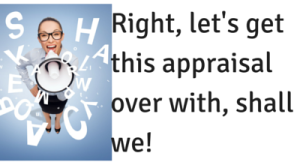How not to do an appraisal
Sitting in Caffe Nero a few days ago I had the uncomfortable experience of watching and hearing a loud and brash young manager (unintentionally, I think) humiliating a soft-spoken direct report.
As appraisals go it was a pretty thorough example of how not to do it.
Rapport – what rapport?
There was no quality of rapport. The manager was clicking his pen, constantly shifting his position in his chair, bouncing his knees under the table as if to an internal fast paced rhythm, he’d start off his very loud comments by looking briefly at his victim and then continue the comments in a quite mechanical manner while gazing out the window beside their table, as if reciting a rehearsed spiel.
He (we’ll call him Jack) demonstrated no attempt to understand the other person’s (let’s call him Mohan) viewpoint and in fact showed little interest in Mohan at all.
Just write this down
Instead it appeared to be a matter of getting Mohan to write down his comments as his own self-assessment. Comments which Jack the manager, while not actually dictating, was definitely steering in the direction that he considered best through comments such as “write this down” or “put this in your own words”.
Other standard appraisal-comments were thrown in such as the string of questions “So, what’s your assessment of yourself… what do you think… how do you think you been doing, since you began here?”
‘Oh, let’s just get on with this!’
Mohan’s soft-spoken and therefore inaudible response was frequently punctuated by Jank’s nodding and absent-minded “yep, yep” utterances – absent-minded because he’d be looking out the window as he was making them, jiggling or bouncing his knees, frequently shifting his position in the chair, and clicking his pen – almost as if he was uninterested, going through the motions, or simply didn’t see any point in the whole process.
Now tick these boxes
When Mohan had finished speaking Jack responded “okay write that down” and pushed a form across the table, Mohan then spent about 10 minutes writing his views – while Jack’s distracted knee jiggling, squirming, window gazing, pen clicking continued.
The form was then taken back by Jack who scanned it and said “What you mean by minimal support? I can’t measure that! I need specifics!” Inaudible response. “Okay now write that down!”
More knee jiggling, more squirming, more pen clicking, more window gazing.
Hey, look at me – I’m a manager
It went down along these lines for probably 20 minutes or more. At one stage I left my table which was, incidentally, about 12 feet from where they were sitting (there were other people sitting nearer to them) to get a glass of water. The water jug was about 25-30 feet away yet Jack’s voice was practically filling the entire room.
I looked around – there were probably 15 to 20 people in the room.
(Next article: So what? It wasn’t a perfect appraisal – but none are – and does it really matter?)
Performance reviews – thanks Reg for dusting off my soap box for me! I spent a year with an on line retailer ‘putting in’ a performance review system.
One of the biggest challenges of course being that the system means nothing – it is just a set of tools, some paperwork, and a way for a big organisation to force behaviours that ‘should’ be systemic but rarely are. Assessing and supporting behaviours is key to continual success, but we seem to constantly miss a trick. Poor Mohan here got the brunt of a system that had not supported Jack.
Everything that you observed here Reg could be put down to how far the system has failed them both. If we believe (and I do!) that people will do the best that they can with the resources that they have available to them, then poor Jack has been given precious few resources to help him through this. He knows that he has to appraise, and get it written down, but there is so much that he is lacking – the 4Rs, the knowledge of the purpose of the review for himself and for Mohan, the ability to see things from another’s perspective, the search for Mohan’s requirements, the ability to give and receive honest and supportive feedback, and not least the desire to operate from a strong positive intent for them both.
It’s easy to be critical. For me this blog has reminded me, yet again, how lucky we are to have been given the gift of NLP – the skills that we have, the knowledge, the choices and the ability to know that there are other ways, if only we stop for long enough to remember to use them. It would be lovely if everyone in the world knew that, but until they do I think that we will continue to see these examples, and I will continue to be reminded of how much my NLP has given me.
Great observations, Caron. Especially in your empathy with Jack – because, you’re right, he’s as much a victim of the organisation’s system.
A system which, judging by this interaction, is plainly lacking in leadership. A good leader (or leadership team) will have their finger on the pulse of the organisation and will pick up and attend to symtoms of the system malfunctioning. And they will do this through people-facing MBWA rather than reading reports.